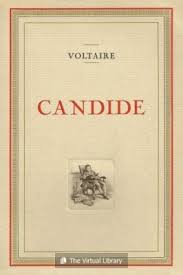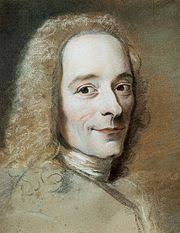Candide Page #6
Candide, ou l'Optimisme, is a French satire first published in 1759 by Voltaire, a philosopher of the Age of Enlightenment.
They both sat down to table, and, when supper was over, they placed themselves once more on the sofa; where they were when Signor Don Issachar arrived. It was the Jewish Sabbath, and Issachar had come to enjoy his rights, and to explain his tender love. IX WHAT BECAME OF CUNEGONDE, CANDIDE, THE GRAND INQUISITOR, AND THE JEW. This Issachar was the most choleric Hebrew that had ever been seen in Israel since the Captivity in Babylon. "What!" said he, "thou bitch of a Galilean, was not the Inquisitor enough for thee? Must this rascal also share with me?" In saying this he drew a long poniard which he always carried about him; and not imagining that his adversary had any arms he threw himself upon Candide: but our honest Westphalian had received a handsome sword from the old woman along with the suit of clothes. He drew his rapier, despite his gentleness, and laid the Israelite stone dead upon the cushions at Cunegonde's feet. "Holy Virgin!" cried she, "what will become of us? A man killed in my apartment! If the officers of justice come, we are lost!" "Had not Pangloss been hanged," said Candide, "he would give us good counsel in this emergency, for he was a profound philosopher. Failing him let us consult the old woman." She was very prudent and commenced to give her opinion when suddenly another little door opened. It was an hour after midnight, it was the beginning of Sunday. This day belonged to my lord the Inquisitor. He entered, and saw the whipped Candide, sword in hand, a dead man upon the floor, Cunegonde aghast, and the old woman giving counsel. At this moment, the following is what passed in the soul of Candide, and how he reasoned: If this holy man call in assistance, he will surely have me burnt; and Cunegonde will perhaps be served in the same manner; he was the cause of my being cruelly whipped; he is my rival; and, as I have now begun to kill, I will kill away, for there is no time to hesitate. This reasoning was clear and instantaneous; so that without giving time to the Inquisitor to recover from his surprise, he pierced him through and through, and cast him beside the Jew. "Yet again!" said Cunegonde, "now there is no mercy for us, we are excommunicated, our last hour has come. How could you do it? you, naturally so gentle, to slay a Jew and a prelate in two minutes!" "My beautiful young lady," responded Candide, "when one is a lover, jealous and whipped by the Inquisition, one stops at nothing." The old woman then put in her word, saying: "There are three Andalusian horses in the stable with bridles and saddles, let the brave Candide get them ready; madame has money, jewels; let us therefore mount quickly on horseback, though I can sit only on one buttock; let us set out for Cadiz, it is the finest weather in the world, and there is great pleasure in travelling in the cool of the night." Immediately Candide saddled the three horses, and Cunegonde, the old woman and he, travelled thirty miles at a stretch. While they were journeying, the Holy Brotherhood entered the house; my lord the Inquisitor was interred in a handsome church, and Issachar's body was thrown upon a dunghill. Candide, Cunegonde, and the old woman, had now reached the little town of Avacena in the midst of the mountains of the Sierra Morena, and were speaking as follows in a public inn. X IN WHAT DISTRESS CANDIDE, CUNEGONDE, AND THE OLD WOMAN ARRIVED AT CADIZ; AND OF THEIR EMBARKATION. "Who was it that robbed me of my money and jewels?" said Cunegonde, all bathed in tears. "How shall we live? What shall we do? Where find Inquisitors or Jews who will give me more?" "Alas!" said the old woman, "I have a shrewd suspicion of a reverend Grey Friar, who stayed last night in the same inn with us at Badajos. God preserve me from judging rashly, but he came into our room twice, and he set out upon his journey long before us." "Alas!" said Candide, "dear Pangloss has often demonstrated to me that the goods of this world are common to all men, and that each has an equal right to them. But according to these principles the Grey Friar ought to have left us enough to carry us through our journey. Have you nothing at all left, my dear Cunegonde?" "Not a farthing," said she. "What then must we do?" said Candide. "Sell one of the horses," replied the old woman. "I will ride behind Miss Cunegonde, though I can hold myself only on one buttock, and we shall reach Cadiz." In the same inn there was a Benedictine prior who bought the horse for a cheap price. Candide, Cunegonde, and the old woman, having passed through Lucena, Chillas, and Lebrixa, arrived at length at Cadiz. A fleet was there getting ready, and troops assembling to bring to reason the reverend Jesuit Fathers of Paraguay, accused of having made one of the native tribes in the neighborhood of San Sacrament revolt against the Kings of Spain and Portugal. Candide having been in the Bulgarian service, performed the military exercise before the general of this little army with so graceful an address, with so intrepid an air, and with such agility and expedition, that he was given the command of a company of foot. Now, he was a captain! He set sail with Miss Cunegonde, the old woman, two valets, and the two Andalusian horses, which had belonged to the grand Inquisitor of Portugal. During their voyage they reasoned a good deal on the philosophy of poor Pangloss. "We are going into another world," said Candide; "and surely it must be there that all is for the best. For I must confess there is reason to complain a little of what passeth in our world in regard to both natural and moral philosophy." "I love you with all my heart," said Cunegonde; "but my soul is still full of fright at that which I have seen and experienced." "All will be well," replied Candide; "the sea of this new world is already better than our European sea; it is calmer, the winds more regular. It is certainly the New World which is the best of all possible worlds." "God grant it," said Cunegonde; "but I have been so horribly unhappy there that my heart is almost closed to hope." "You complain," said the old woman; "alas! you have not known such misfortunes as mine." Cunegonde almost broke out laughing, finding the good woman very amusing, for pretending to have been as unfortunate as she.
Translation
Translate and read this book in other languages:
Select another language:
- - Select -
- 简体中文 (Chinese - Simplified)
- 繁體中文 (Chinese - Traditional)
- Español (Spanish)
- Esperanto (Esperanto)
- 日本語 (Japanese)
- Português (Portuguese)
- Deutsch (German)
- العربية (Arabic)
- Français (French)
- Русский (Russian)
- ಕನ್ನಡ (Kannada)
- 한국어 (Korean)
- עברית (Hebrew)
- Gaeilge (Irish)
- Українська (Ukrainian)
- اردو (Urdu)
- Magyar (Hungarian)
- मानक हिन्दी (Hindi)
- Indonesia (Indonesian)
- Italiano (Italian)
- தமிழ் (Tamil)
- Türkçe (Turkish)
- తెలుగు (Telugu)
- ภาษาไทย (Thai)
- Tiếng Việt (Vietnamese)
- Čeština (Czech)
- Polski (Polish)
- Bahasa Indonesia (Indonesian)
- Românește (Romanian)
- Nederlands (Dutch)
- Ελληνικά (Greek)
- Latinum (Latin)
- Svenska (Swedish)
- Dansk (Danish)
- Suomi (Finnish)
- فارسی (Persian)
- ייִדיש (Yiddish)
- հայերեն (Armenian)
- Norsk (Norwegian)
- English (English)
Citation
Use the citation below to add this book to your bibliography:
Style:MLAChicagoAPA
"Candide Books." Literature.com. STANDS4 LLC, 2025. Web. 21 Jan. 2025. <https://www.literature.com/book/candide_25>.




Discuss this Candide book with the community:
Report Comment
We're doing our best to make sure our content is useful, accurate and safe.
If by any chance you spot an inappropriate comment while navigating through our website please use this form to let us know, and we'll take care of it shortly.
Attachment
You need to be logged in to favorite.
Log In